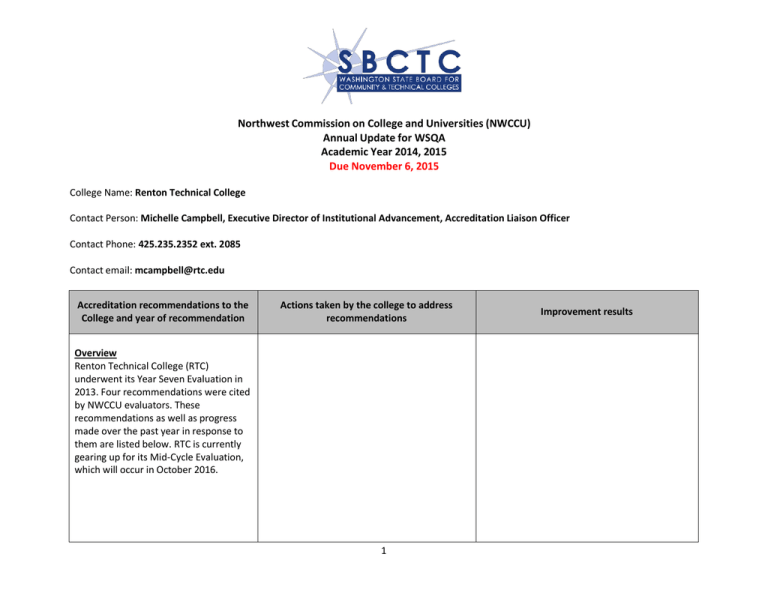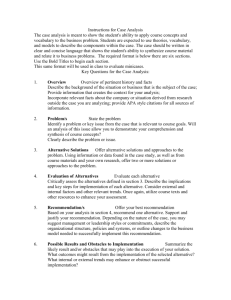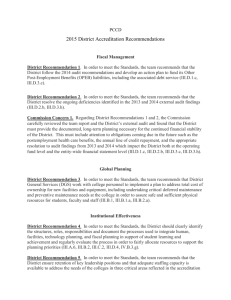Northwest Commission on College and Universities (NWCCU) Annual Update for WSQA
advertisement

Northwest Commission on College and Universities (NWCCU) Annual Update for WSQA Academic Year 2014, 2015 Due November 6, 2015 College Name: Renton Technical College Contact Person: Michelle Campbell, Executive Director of Institutional Advancement, Accreditation Liaison Officer Contact Phone: 425.235.2352 ext. 2085 Contact email: mcampbell@rtc.edu Accreditation recommendations to the College and year of recommendation Actions taken by the college to address recommendations Overview Renton Technical College (RTC) underwent its Year Seven Evaluation in 2013. Four recommendations were cited by NWCCU evaluators. These recommendations as well as progress made over the past year in response to them are listed below. RTC is currently gearing up for its Mid-Cycle Evaluation, which will occur in October 2016. 1 Improvement results Recommendations from 2013 Site Visit Recommendation 1: The evaluation committee recommends that for each year of operation, the College undergo an external financial audit and that the results from such audits, including findings and management letter recommendations, be considered in a timely, appropriate and comprehensive manner by the Board of Trustees (Eligibility Requirement 19 and Standard 2.F.7). Recommendation 1: Renton Technical College contracted with the Washington State Auditor’s Office (SAO) to complete the College’s financial statement audit for fiscal year 2013 – 2014. The SAO completed their work in September and issued their Financial Statements Audit Report on September 24, 2015. The College is working with the SAO to schedule our fiscal year 2014-2015 audit. Recommendation 1: On September 15, 2015, the auditors presented their report in an exit conference to the President, a member of the Board of Trustees and the College’s financial managers. There was one audit finding related to the reporting of Student Tuition and Fees and Scholarships and Fellowships. The College made the necessary adjustment in the final Financial Statements. The Financial Statements and Audit report were reviewed by college administration. The Audit Report was presented to the Board of Trustees at their October 2015 meeting. The College is in process of finalizing the presentation of the Financial Statements to publish on our website and is planning a study session with the Board of Trustees to perform a more extensive review and allow time for questions. Recommendation 2: The evaluation committee found evidence of multiple planning processes that appear confusing, lack meaningful evidence, and are not broadly understood across the institution. The evaluation committee recommends that the College evaluate its planning cycle to ensure it is effective and systematic, allows for constituent input and broad communication, encourages self-reflection, and results in evidence-based assessment of its accomplishments (Standards 3.A.1., 3.A.2., 3.A.3., and 5.A.1.) Recommendation 2: RTC’s strategic priorities and four core themes serve as the foundation of the College’s operational planning process. Each core theme consists of three to five objectives. The College has identified 21 key performance indicators for measuring gains. Division (administrative services, student services, instruction, advancement, human resources, and information technology) leaders work with their departments to identify and set priorities for the year. These priorities are reflected in the operational plan and are linked to other strategic initiatives for which the College is involved. Updates and reflection occur at the six and 12-month mark. Recommendation 2: RTC reviews and revises its key performance indicators as needed. Over the past year, the College has worked diligently to streamline and align its planning process with key initiatives that include a focus on increasing associate degree completion, Achieving the Dream, and guided pathways. Visual alignment and improved communication is underway. 2 Recommendation 3: The evaluation committee recommends that the College ensure that planning is informed by meaningful and verifiable indicators which are evaluated and analyzed at the program, department, and direct service level, as well as within the context of the core themes, in order to determine areas of improvement, to inform decision making, and to prioritize the allocation of resources (Standards 1.B.2., 3.A.3., 3.B.3., 4.A.1., and 4.B.1.). Recommendation 3: Over the past year, RTC’s planning process has focused specifically on aligning college priorities to the strategic priorities and core themes. In doing so, the College is in the process of adopting a new planning template that will simplify and streamline the way in which priorities are set, information is gathered, and how we report out and show progress. The Institutional Advancement Division is spearheading this effort in collaboration with division leads. Recommendation 3: The Institutional Advancement Division, in conjunction with key stakeholders continues to work toward more clearly defined outcomes for setting and communicating college priorities as they pertain to planning and the standards of accreditation. Recommendation 4: The evaluation committee recommends that the College engage in an evidence-based evaluation of assessment processes to ensure that student learning outcomes are clearly identified, consistently provided to students and that the assessment results are used to enhance teaching and learning and to inform the planning process for academic programs and services (Standards 2.C.10, 4.A.6., and 4.B.2.). Recommendation 4: The College will continue to support the process of developing and aligning course, program, and college learning outcomes, and linking outcomes to assessment. The revised program review process will incorporate this work. Recommendation 4: Program learning outcomes have been identified and reviewed for at least 90% of RTC programs. To ensure student learning outcomes are consistently provided to students, the majority of faculty now use a comprehensive syllabus template in the Canvas LMS. Approved program learning outcomes are posted to the RTC website. Faculty are currently developing course learning outcomes that align to program learning outcomes and college learning outcomes. 3



